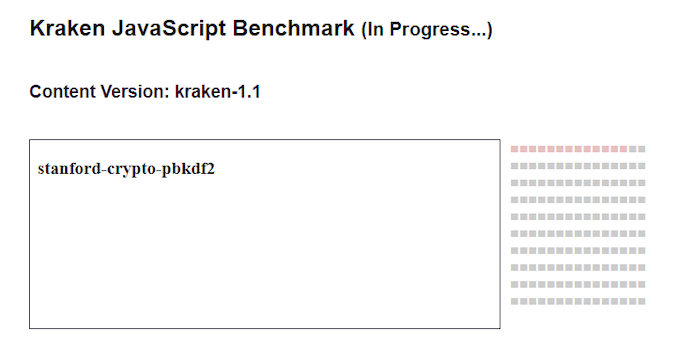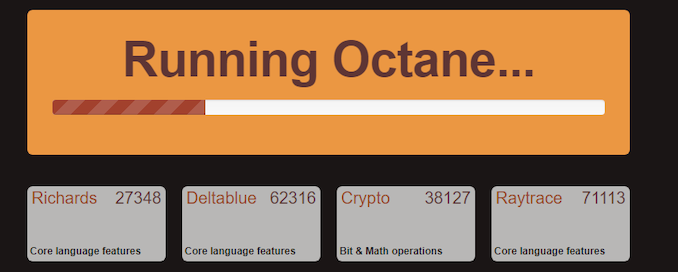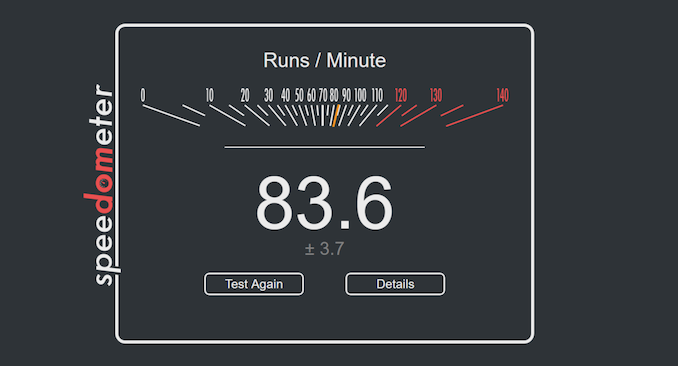Intel 11th Generation Core Tiger Lake-H Performance Review: Fast and Power Hungry
by Brett Howse & Andrei Frumusanu on May 17, 2021 9:00 AM EST- Posted in
- CPUs
- Intel
- 10nm
- Willow Cove
- SuperFin
- 11th Gen
- Tiger Lake-H
CPU Tests: Legacy and Web
In order to gather data to compare with older benchmarks, we are still keeping a number of tests under our ‘legacy’ section. This includes all the former major versions of CineBench (R15, R11.5, R10) as well as x264 HD 3.0 and the first very naïve version of 3DPM v2.1. We won’t be transferring the data over from the old testing into Bench, otherwise it would be populated with 200 CPUs with only one data point, so it will fill up as we test more CPUs like the others.
The other section here is our web tests.
Web Tests: Kraken, Octane, and Speedometer
Benchmarking using web tools is always a bit difficult. Browsers change almost daily, and the way the web is used changes even quicker. While there is some scope for advanced computational based benchmarks, most users care about responsiveness, which requires a strong back-end to work quickly to provide on the front-end. The benchmarks we chose for our web tests are essentially industry standards – at least once upon a time.
It should be noted that for each test, the browser is closed and re-opened a new with a fresh cache. We use a fixed Chromium version for our tests with the update capabilities removed to ensure consistency.
Mozilla Kraken 1.1
Kraken is a 2010 benchmark from Mozilla and does a series of JavaScript tests. These tests are a little more involved than previous tests, looking at artificial intelligence, audio manipulation, image manipulation, json parsing, and cryptographic functions. The benchmark starts with an initial download of data for the audio and imaging, and then runs through 10 times giving a timed result.
We loop through the 10-run test four times (so that’s a total of 40 runs), and average the four end-results. The result is given as time to complete the test, and we’re reaching a slow asymptotic limit with regards the highest IPC processors.

Google Octane 2.0
Our second test is also JavaScript based, but uses a lot more variation of newer JS techniques, such as object-oriented programming, kernel simulation, object creation/destruction, garbage collection, array manipulations, compiler latency and code execution.
Octane was developed after the discontinuation of other tests, with the goal of being more web-like than previous tests. It has been a popular benchmark, making it an obvious target for optimizations in the JavaScript engines. Ultimately it was retired in early 2017 due to this, although it is still widely used as a tool to determine general CPU performance in a number of web tasks.

Speedometer 2: JavaScript Frameworks
Our newest web test is Speedometer 2, which is a test over a series of JavaScript frameworks to do three simple things: built a list, enable each item in the list, and remove the list. All the frameworks implement the same visual cues, but obviously apply them from different coding angles.
Our test goes through the list of frameworks, and produces a final score indicative of ‘rpm’, one of the benchmarks internal metrics.
We repeat over the benchmark for a dozen loops, taking the average of the last five.

Legacy Tests

















229 Comments
View All Comments
Andrei Frumusanu - Monday, May 17, 2021 - link
As a note, we're just finishing up this review at the very last minute due to us getting our hands on the reference laptop only in the last 48h. I'll be completing the missing page texts in the next few hours as we're tidying up the article.EliteRetard - Monday, May 17, 2021 - link
Did you have a description/specs of the test systems?If it was there I missed it, even after going back to look.
Differences in RAM / storage etc. can affect some tests.
I'm guessing the size based on the name of the Asus...
Looks like you're comparing a 16" workstation vs a 13" thin/light?
Would the AMD CPU perform better in a larger/cooler chassis?
timecop1818 - Tuesday, May 18, 2021 - link
> Would the AMD CPU perform betterlol
Spunjji - Tuesday, May 18, 2021 - link
> timecop1818lol
Qasar - Tuesday, May 18, 2021 - link
gotta love timecrap181...at_clucks - Wednesday, May 19, 2021 - link
Come on, the Intel CPU actually performs decently... for a slowish desktop CPU stuck in a laptop chassis. Still not that bad.Spunjji - Thursday, May 20, 2021 - link
It performs very well, but timcarp1488 was completely misreading what had actually been said just to shitpost his usual anti-AMD nonsense.Spunjji - Tuesday, May 18, 2021 - link
"Did you have a description/specs of the test systems?"A brief description of the Intel reference system is in this review, more detail of the AMD system is available in the review these test results came from.
"Would the AMD CPU perform better in a larger/cooler chassis?"
A 45W variant of the AMD CPU in a larger chassis would see higher sustained multi-core performance, but single-core is probably quite similar.
Gondalf - Wednesday, May 19, 2021 - link
Strange article Andrei.5980HS is rated 35-54 W or 45W+. How can you judge that 45W Intel is less efficient?? Have you data about TDP settings of Asus X13 ? Likely the AMD SKU run at the highest TDP for more performance on Asus device, for several minutes or continuously.
Bet you neeed to be more informed in your articles, OEMs can go at the max TDP of a cpu since the Tskin of the laptop allow this.
Bet Intel Tiger Lake H will be faster than in your article on the right chassis ?
Bet direct power measures are better than generic comments ?
Retycint - Thursday, May 20, 2021 - link
Strange comment Gondalf.The graph of the 5980HS on page 2 shows that the Asus X13 runs at 42W for about 300s and then drops to 35W for the rest of the time.
Bet you didn't read the article and just came down instantly to try and feel smug?
Bet you need to be more informed when making hate posts?